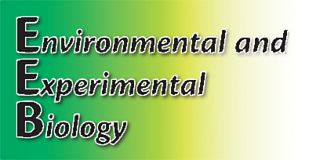
On-line: ISSN 2255–9582

| Faculty of Biology, University of Latvia | ||||||

|
Hard copy: ISSN 1691–8088
On-line: ISSN 2255–9582 Environ Exp Biol (2024) 22: 1–9
|
|||||

|
About the Journal | Retractions | Open Access | Author Guidlines | Current Issue | Archive |
|
Environmental and Experimental Biology |
Environ Exp Biol (2024) 22: 1–9 |
Inconsistent results on the effects of humic substances (HS) on yield and nutrient status of important food crops, including oilseeds, confirm the need for further research on different HS products to match their use to actual field conditions. The aim of this study was to evaluate the effect of foliar application of commercially produced peat- and vermicompost-derived HS preparations on nutrient status and yield of spring oilseed rape (Brassica napus). The field experiment was carried out in Stende State Cereals Breeding Institute, Latvia, during the vegetation season of 2012, using the spring oilseed rape cultivar ‘Perfect’. Although foliar sprays of HS were applied during the critical stages of crop development from rapid growth to flowering, they were ineffective in improving the supply of the deficient nutrients (N, K, B, Zn, Cu) in leaves. Moreover, both tested HS products caused a decrease in Cu and B content in the seeds, which resulted in a negative trend in oilseed rape seed yield. Therefore, the conducted experiment demonstrated that foliar application of both HS preparations was ineffective to promote nutrient status and did not contribute to spring oilseed rape yield.